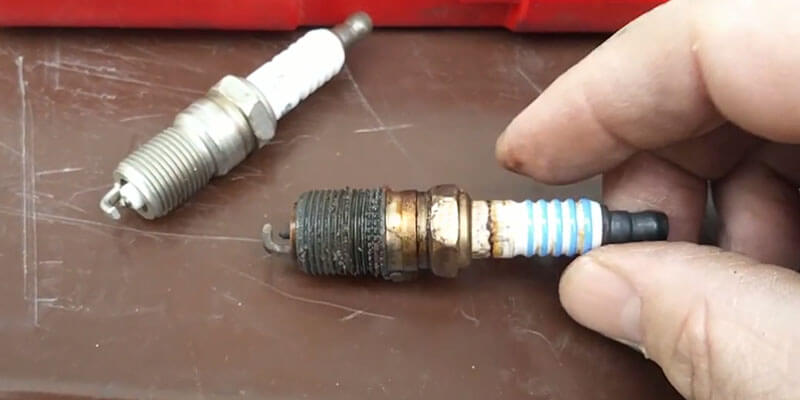Suppose you’re on a road trip, riding through the wind like a stallion; the surrounding is breathtaking. And then your spark plugs get broken in the middle of nowhere.
So now the question is, how far can you drive with a blown-out spark plug? Most importantly, is it even safe to do that?
Well, you don’t know when you’ll become a victim of circumstances like that. And so, to be aware, keep scrolling to know everything about dealing with this issue successfully!
Can I Drive with a Blown-Out Spark Plug?
If the spark plug is blown out entirely, your vehicle won’t start. Yes, that’s it!
When the spark plugs get destroyed, there’ll be a burst of electricity in the coil. As a result, the engine won’t have enough torque to push the pistons over. Hence, it may turn over if you try to start your vehicle, but you won’t be able to drive it.
However, when there’s still some life left on the plugs, meaning the spark plugs are badly damaged but not blown yet, you might be able to drive your car for a few miles.
So yes, there’ll be enough time for you to reach help as you can’t fix it in the middle of the road. But the problem is while driving a vehicle with a blown-out spark plug, you’ll face tons of performance issues.
For instance, the fuel consumption will be crazy high, and there’ll be some acceleration troubles as well. And if you keep driving in that condition, the engine will get damaged pretty badly, and you don’t want that.
So, when your car’s going through spark plug issues, it would be better if you don’t drive the car for too long. Once you can get help, park your car right there, call a mechanic, or fix it by yourself, whichever you prefer.
What Are the Symptoms of a Damaged Spark Plug
To ensure a better driving experience, you should know the blown spark plug symptoms. This way, you can foresee the upcoming danger and take steps accordingly.
Engine Misfiring
One of the most common symptoms of damaged spark plugs is a frequently misfiring engine. When the engine is misfiring, you’ll be having a problem with the acceleration.
As a result, you won’t be able to run at full speed, and there’ll be no smoothness in the car’s performance whatsoever. However, engine misfiring can happen due to many reasons.
This issue can be caused by a badly damaged ignition coil plug cap or if you’re using cheap fuel. But when it’s happening continuously, you should definitely inspect the spark plugs before doing anything else.
If there’s any damage, take steps accordingly to ensure the safest driving experience.
Having Issues While Starting the Vehicle
A blown-out or worn-out spark plug will never allow your vehicle to start. Therefore, whenever you feel any hitches while starting your car, you can take a look at the spark plug to make sure if they need any repair or not.
Mostly battery problems or an empty gas tank stop the car from starting smoothly. But even after reviewing those problems, the vehicle is failing to start.
It means that the engine isn’t getting the spark needed for starting the combustions. Thus, check out your spark plugs whenever you’re experiencing this particular complication.
Excessive Fuel Consumption
Another common symptom indicated your vehicle might be having spark plug problems. When the plugs are worn out, there’ll be massive energy consumption. So, if buying gasoline for your car and clear out your bank account, it’s time to inspect the spark plug.
If your car runs with faulty spark plugs, the fuel won’t be properly burned in the combustion chamber. Consequently, the engine will suffer from frequent engine misfires, and your fuel economy will take a serious hit.
So, if you think you’re buying more fuel than usual, but you’re not going on any extravagant car rides, examine the spark plugs to solve the case.
Engine Knocking
Are you hearing any knocking sound from your car’s engine while turning up the speed? If so, your vehicle may have a damaged spark plug.
When the spark plug fails to detonate accurately and ignite all the gas, the fuel, and vapor will fire. If it occurs, you’ll hear a knocking sound from the engine. But this degree of spark plug damage can be salvaged.
How Can You Prevent a Spark Plug Blowout
Now that you’ve learned about the reasons that can cause faulty spark plugs, it’s time to know how to prevent this problem. Don’t worry; the tips we’re about to share are no rocket science, so you can easily follow the directions.
Let’s proceed, shall we?
Install the Plugs Accurately
Some people often ask, what causes a spark plug to back out? The answer is incorrect installation.
Spark plugs mostly get damaged due to improper fitting. Therefore, if you’re installing these parts yourself, make sure you know the procedure correctly. Otherwise, you should get professional help for an optimal experience.
Sometimes we tighten the plugs too much or keep them loose. For this reason, the spark plug fails to perform and starts giving trouble. Thus, learn the proper procedure before you try to install it.
And yes, always use hand force while working with these plugs, don’t use any tools with brutal force. It’ll damage the whole thing even before you try to drive your car.
Get the Right Spark Plugs
If your shoe size is 9, you cannot wear size 6, can you? Well, the same goes for spark plugs.
Every car has its unique specs when it comes to mechanical parts. Therefore, make sure you’re buying the plugs that are compatible with your vehicle’s model.
Otherwise, the plugs won’t fit, or if you succeed in installing it miraculously, your car will break down after a few miles; and that’s a no-no!
Pay Attention to Noises
When your engine is in good condition, it’ll roar like a tiger, and the howling will be smooth. But if you’re getting any strange sounds like knocking, coughing, or ticking, immediately stop driving and check the engine.
These noises tell you a lot of things. So, if anything is happening out blue, take the vehicle to a good mechanic for your safety’s sake.
Check the Torque
The toque varies from car to car, depending on the spark plugs and the engine type. And you have to maintain an optimal level of torque while driving your vehicle.
You can find the ideal torque reference on the owner’s manual. Take your vehicle to a certified mechanic and get the torque checked from time to time.
There’s nothing to worry about if it’s on the proper level. If not, take measures to solve that issue as soon as possible.
FAQ
The repairing cost mostly depends on the level of damage that happens to your engine. Usually, it takes around $500-$1000 if you take your car to a good mechanic.
Depending on the types of your spark plugs, you should replace them between 30,000-90,000 miles to enjoy a better driving experience.
Yes, if a spark plug fell out and you couldn’t find it, you can drive your vehicle with this missing part. But you shouldn’t do that as the car will be suffering from various performance issues. So, you need to fix this problem ASAP!
For beginners, the process may feel a bit complicated. But if you learn the procedure and try it a few times, you’ll be able to complete the whole task in about an hour. In this way, all you need is to buy the replacement plugs, and the mechanic’s fee will be saved!
Yes, it is possible to drive the car on 3 or 5 cylinders if it’s a 6-cylinder vehicle.
Conclusion
We believe you’ve got your answers by now! Though you can drive your car for a while, even the plugs have blown out, but it’s not, to be honest.
Therefore, the wisest thing is to replace the plugs as soon as possible when it happens. Otherwise, any unpleasant accident may happen, or your car’s engine will be damaged beyond any repairing!
Thus, don’t drive your cars when there’s an issue with the spark plugs to save money and lives.


